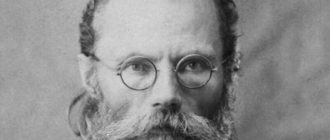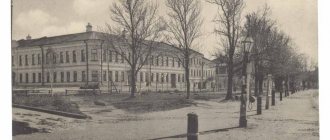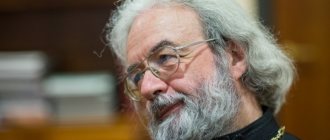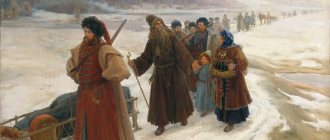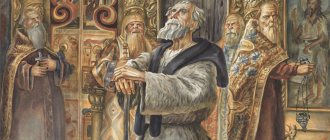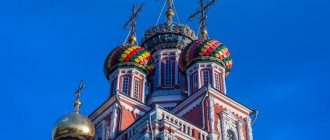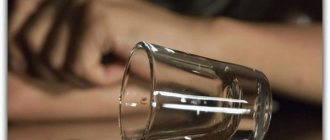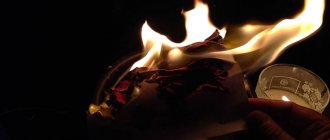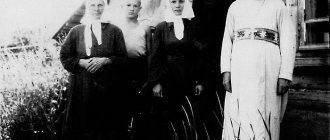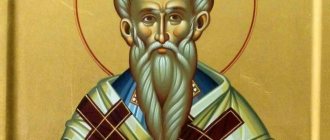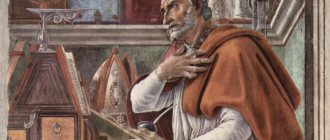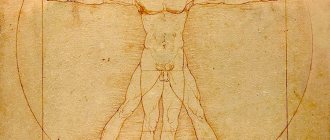Priest Father Nikon Vorobyov is a monk, spiritual writer, since 1956 hegumen of the Orthodox Church, author of numerous letters to his spiritual children, Orthodox philosopher, interpreter of the lives and messages of the Holy Fathers.
The Russian Orthodox Church is rich in people who leave a bright light in its history. Such a bright “beacon” of the church was Father Nikon (Nikolai Nikolaevich Vorobyov). His sermons, instructions and discussions on many everyday problems, without a doubt, need to be listened to and read by all Orthodox people.
Vorobyov's childhood
Nikolai (secular name Nikon Vorobyov) was born into a large peasant family on May 4, 1894 in the village of Mikshino, Tver province.
Origin and birth
At first, the biography of Nikolai Vorobyov was the most ordinary, he grew up like all boys, his father and mother were simple peasants, very religious and devout people. Unfortunately, the archives do not contain photographs or descriptions of Nikolai himself as a child or his parents. But it can be assumed that the life of a peasant child at that time was difficult from the very beginning.
Family
The family into which Nikolai was born was large; everyone in it knew how and loved to work. Kolya had 6 more younger brothers. The boy was very inquisitive and active; he did not stand out among other children. The only difference is that he was very compassionate and kind. Since childhood, Nikolai had a strong desire to get to the bottom of things; his character had a special honesty and decency. Kolya studied very well and graduated with honors from a rural school.
Later, Abbot Nikon recalled that monasticism was predicted for him as a child. In their village lived the holy fool Vanka, who one day approached little Kolya and began pointing his finger at him, repeating: “Monk, monk.”
Nikolai's education
When Kolya grew up, his father sent him to a real school in the city of Vyshny Volochek. The talented boy began his studies with zeal.
Thanks to his innate perseverance and responsibility, he was given even the most difficult disciplines:
- drawing;
- drawing;
- mathematics;
- singing;
- dancing;
- playing the viola.
All his talents did not go unnoticed among the teaching staff: during his years of study at the real school, Kolya received several certificates of merit and certificates.
The parents helped their son with money as much as they could, however, when the younger brothers grew up, parental help was reduced: it was necessary to raise the rest of the children. Nikolai did not despair; he continued his studies with the same zeal. He obtained funds to pay for housing and food by helping his rich comrades who were behind in their studies.
Soon his younger brother Mikhail entered the same real school, and Kolya took upon himself the care of its maintenance. And although it was very difficult for him, he did not deviate from his goal: to finish his studies and help his younger brother.
Nikolai Vorobyov came from a believing Orthodox family, however, as often happens, this faith was “superficial”, without deep understanding and penetration into the soul. When Nikolai plunged headlong into studying science at school, he thought that this was the real truth, he became an atheist.
Like any growing young man, he wanted to get to the bottom of the meaning of life, and decided that he would find it in philosophy. He began to study philosophical works with enthusiasm; with his last money he could buy an interesting book, preferring it to dinner. Over time, Nikolai achieved great success in philosophy, even the school teachers consulted with him. However, Nikolai soon realized that this science did not provide answers to the life questions that tormented him.
Father's experience
The letters of Abbot Nikon Vorobyov to his spiritual children deserve serious attention. It is based not only on the theoretical experience of theological reasoning about the path of spiritual life, but also on the most difficult bitter experience called our own.
Father Nikon wrote in one of these letters that success in spiritual life is measured by the depth of humility. Why do breakdowns in spiritual activity occur so often? Because these very actions are based on one’s own pride and conceit. And how can the Lord approach such a person? How can I help him? Until a person sees his weakness and begins to pray with humility, the Savior cannot approach him.
Teenage years and early life
In 1914, Nikolai Vorobyov brilliantly graduated from real school. He is faced with a choice of further path. By this time, Nikolai had already become completely disillusioned with philosophy as a science capable of providing answers to the questions that tormented him about the meaning of life and man’s place in it.
Admission to university
The young man decides to continue his education at the Petrograd Psychoneurological Institute and study human physiology; he successfully passes the entrance exams and plunges headlong into a new science for him. But after a year of study, he will be even more disappointed. And here he does not find answers to his questions that have bothered him almost since childhood.
Nikolai falls into severe depression and experiences severe psychological shock. He leaves his studies at the institute. His mental breakdown was so great that he began to think about suicide.
Introduction to religion
In the summer of 1915, Nikolai Vorobyov is on the verge of suicide. Remembering God, Nikolai from all his depths, almost in despair, exclaimed: “Lord, if You exist, then reveal yourself to me! I am not looking for You for any earthly, selfish purposes. I only need one thing: are You there, or are you not?”
And God answered Vorobyov’s prayer. Later, Abbot Nikon recalled that this was a kind of Revelation, after which some kind of moral turning point occurred in his soul.
He could not say exactly what happened to him, but from that time Nikolai Vorobyov believed in God completely and irrevocably, and saw his path and destiny. He was no longer interested in worldly life and worldly hobbies. He devoted himself to studying and saying prayers, reading the Gospel and the Revelations of the Holy Fathers.
From memoirs:
“And only in the holy fathers and in the Gospel did I find something truly valuable. When a person begins to struggle with himself and strives to follow the path of the Gospel, then the holy fathers will become necessary for him and his relatives. The Holy Father is already a dear teacher who speaks to your soul, and it perceives it with joy and is comforted. Just as these philosophies and all sorts of sectarian nasty things caused melancholy, despondency, and vomiting, so, on the contrary, he came to his fathers as if he were visiting his own mother. They consoled me, enlightened me, nourished me.”
In 1917, Vorobyov entered the Moscow Theological Academy, where he very zealously began to study the basics of Theology, however, revolutionary events in Petrograd and the capital interrupted his studies. Following the revolution, political changes began in the country. Vorobyov leaves for the village of Sosnovitsy (near Vyshny Volochok) and for some time works as a mathematics teacher at a local school.
From memories:
“And there [in Sosnovitsy] he lived as an ascetic: he ate a piece of bread, a plate of empty cabbage soup. There were almost no potatoes then. And during this, so to speak, real ascetic life (now everything can be said), I was in prayer all day - I was in prayer and in fasting. And it was then that I understood spiritual life, the inner state: the Lord revealed the action in the heart of prayer.”
Then, by the will of Fate, he again finds himself in Moscow and works as a psalm reader (reader) at the Boris and Gleb Church.
Monastic tonsure
Vorobyov became more and more imbued with Christian teaching, and by 1931 he firmly decided to choose the monastic path for himself. On Palm Sunday, 1931, April 5 (March 23, old style), at the Kozyrevskoye cemetery at the Church of St. Nicholas the Wonderworker in Minsk, he was tonsured a monk by Bishop Feofan (Semenyako). For the sake of this event, both came to Minsk from Moscow. When he was tonsured, Nicholas was given the name Nikon.
Reverence
The elder’s spiritual children said that at his burial they felt, along with their sorrows, a certain spiritual joy, akin to Easter joy - as if a new saint had appeared in the Kingdom of Heaven. The question of glorifying Abbot Nikon has been raised for many years: for example, since 2005, documents for him began to be prepared in Belarus, where the priest served. However, the issue of glorification has not yet been resolved. But his letters to spiritual children and sermons are published in thousands of copies, giving our contemporaries answers to spiritual questions.
Mature age
Monk Nikon consciously took monastic vows when he was already an adult. His whole life before this step was a series of doubts and searches. Why did a person come into this world if his life is short and his deeds are empty? What is the highest truth? He found answers to his questions in serving God and renouncing worldly affairs.
Years of clergy
On April 7, 1931, Nikon was ordained to the rank of hierodeacon, and by 1933 to the rank of hieromonk. He is increasingly imbued with the ideas of Christianity. People who knew him recalled that he devoted most of his time, free from divine services, to intense prayers and meek humility.
Interrogations and arrests
Zealous service to God and an irreconcilable attitude towards the new government, which declared the church an enemy of the state, attracted the close attention of punitive authorities to the monk Nikon.
Also in 1933, Father Nikon was arrested for anti-revolutionary activities and agitation, convicted and sent to Siberian camps for five years. He was interrogated several times. The investigative reports, which were recently declassified, indicate that he did not renounce his faith even under pain of imprisonment. It is also clear from these documents that the priest did not slander his fellow believers and did not give false testimony. Father Nikon was released only in 1937. He settled again in Vyshny Volochyok and got a job as a servant in the house of a local doctor.
Here Nikon’s faith was again tested, since the doctor’s wife and her sister were ardent atheists, they often allowed themselves unflattering statements about believers, Nikon had to meekly come to terms with this. By his example of meekness and righteous life, Father Nikon encouraged the sisters to reconsider their religious beliefs and accept faith in Christ. The sister of the wife of the doctor for whom Nikon served, Elena Efimovna, herself a doctor by profession, became a nun with the new name Seraphim.
In 1941, the Great Patriotic War began in the country. The country's leadership decided to open churches and temples for believers so that they could offer prayers for victory over the enemy and for the health of soldiers. Father Nikon immediately begins his priestly service.
In 1944, Archbishop Vasily of Kalinin and Smolensk appointed him rector of the Annunciation Church in the city of Kozelsk, where the priest served until 1948. All this time, Nikon rented a room from local nuns, preached a lot and led a very ascetic lifestyle. Later, he told his spiritual son, a prominent theologian and apologist of our days, A.I. Osipov, that in those days five potatoes and a cup of water a day were enough for him.
From Kozelsk Nikon was transferred to Belev, then to Efremov (both towns are in the Tula region). After that he served in Smolensk. From there, Father Nikon was appointed to head the parish in Gzhatsk. The parish was in an extremely neglected and poor state; Nikon himself considered this appointment as an exile.
Nikon spent a lot of mental and physical strength to bring the parish out of desolation. He was strict with others when necessary and was endlessly demanding of himself. He went to bed very late and got up very early in the morning in order to be “fully armed” by the beginning of the service in the parish, read morning prayers, and prepared for the service with special zeal.
Despite poor health associated with the camp past, Nikon worked a lot physically in the parish garden, he had greenhouses, and he himself grew various vegetables. Since he learned a lot in his life, his harvests were excellent, he loved the land and knew how to work on it. I read a lot in my free time. Spiritually, according to the priest, the “Gzhatsky period of life” gave him a lot. And most importantly, he understood, experienced here a state of initial, as he himself said, humility. In 1956, Father Nikon was awarded the rank of abbot.
last years of life
In 1962, the abbot’s health deteriorated greatly, as a result of the Siberian camps. He grew weaker and weaker and began to get tired very quickly. I ate very little: some white bread, berries and milk. However, he never complained about his health and always maintained clarity of thought and peace of mind.
A few days before his death, he went to bed, his strength completely deserted him. Before the feast of the Dormition of the Mother of God, he confessed his neighbors and spiritual children for the last time, held soul-saving conversations with them, bequeathed to preserve the faith by fulfilling the commandments and repentance in every possible way, to adhere in every possible way to St. Ignatius (Brianchaninov), to avoid especially vanity, which completely devastates the soul and leads it away from God. . He himself could no longer go to church and received communion of the Holy Mysteries several times at home.
“There is nothing to feel sorry for me. I must thank God that I have already completed my earthly journey. I never wanted to live, I didn’t see anything interesting in this life, and I was always surprised how others find something in it and cling to it with all their might. Although I have not done anything good in my life, I have always sincerely strived for God. Therefore, I hope with all my soul for God’s mercy. The Lord cannot reject a person who has always strived for Him with all his might. I feel sorry for you. Anything else waiting for you? The living will envy the dead."
Nikon died on September 7, 1963, in the afternoon, at 12:25.
From the memoirs of the student and spiritual child of Abbot Nikon A. I. Osipov:
“We should especially note the atmosphere of inner joy that reigned in the church during the liturgy among the worshipers and during the funeral service for the priest. The complete impression of some unusual celebration, a great holiday. The incomprehensible spirit of joy dissolved universal sincere sorrow. This can be explained by the blissful posthumous state and the prayers of the priest. His repose seemed to his relatives, spiritually close ones and the entire flock as if hidden in the morning pre-sun fog. The church was crowded that day, as if it were Easter, and many people later spoke about the feeling of a special, incomprehensible festive celebration during the service.”
Strictness in everything
Father Nikon was distinguished by his strictness in worship. Didn't like artistry. He believed that one should serve simply, without pretentiousness. And he demanded the same from others. There was a case when, at the Six Psalms, the reader became carried away by this very artistry. And Hieromonk Nikon interrupted him, replacing him with another reader.
I didn’t like it when psalm-readers practiced quick reading.
He paid special attention to confession. I made sure that the sacrament of repentance remained a sacrament, and did not turn into a formal rite of “resolution from sins.”
The priest was strict not only towards his readers and psalm-readers. He didn't let himself go. Early rises, late bedtimes, physical labor in between prayers, reading - he did all this, despite his poor health.
In 1956, Father Nikon was awarded the rank of abbot.
Literary heritage
Father Nikon left a huge legacy for our contemporaries. His instructions, books, sermons and personal rich life experience for both the adult population and the younger generation are the key to self-knowledge and to answers to many life questions that concern each of us.
Features of the author's style
Many Orthodox priests consider Hegumen Nikon Vorobyov a person who is worthy of being glorified as a saint. His instructions to spiritual students were collected and published with the participation of Professor of the Moscow Theological Academy Alexei Ilyich Osipov, a student and spiritual child of the holy elder.
The very manner in which Father Nikon talks with his followers in his books speaks of the high spirituality and education of this man. He had excellent oratory and was a master of words. Father does not impose his opinion, but advises and gives examples from the lives of the Holy Fathers, and always leaves the final choice to the reader himself.
Letters on Spiritual Life
The spiritual letters of Abbot Nikon Vorobyov are addressed to specific people. But at the same time, they touch upon problems that should concern every Orthodox person who strives to live according to the word of God, in a Christian way.
This is not just a statement of the Law of God, the lives of the holy fathers. In his works, Nikon shares with readers his experience of understanding God and the meaning of spiritual life, and helps believers apply spiritual knowledge in modern life.
How to live today
In the book “How to Live Today,” Abbot Nikon Vorobyov translates the teachings of the holy fathers into a modern language that is understandable to us. It is known that Nikon was a great admirer of the works and reasonings of St. Ignatius (Brianchaninov), and recommends it for reading by every Orthodox believer. He writes that not only should one never lose heart and one must fight, but one must turn to the Lord every time. Ask God for protection and help, and you should always analyze your past experiences, trying to avoid repeating mistakes that have already been made.
We are left to repent
Nikon's messages to his spiritual children were repeatedly republished under the title “Repentance is Left to Us.” This is a book that contains more than 300 letters from the Mentor about spiritual life, in which he gives answers to the most important questions and instructs his children on the path of true Christianity.
The elder calls us to abandon laziness, to work, to bear the burdens not only of our own, but also of others. For this, God loves us and forgives us. Human sins destroy the soul and turn a person away from God. A person’s salvation is born from his repentance, from a feeling of pity, not for himself, but for his loved ones, which is capable of awakening the human soul from sleep, awakening meekness and humility in a person’s heart.
Other works
Among other best works of Father Nikon are:
- “Lord, open yourself to me.”
- “On the Beginnings of Life” (audio available on two CDs). The book is in two parts, the first is about pride and self-justification, the second is letters about spiritual life, Theophan the Recluse.
- "Take heed." The collection contains instructions based on the patristic heritage and supported by our own experience of spiritual work.
- “Be kind to yourself. Letters to a drinking brother." The letters are addressed to a person subject to the destructive vice of drunkenness.
- "Pure heart"
- "On unceasing prayer."
- “Letters to Spiritual Children” by Abbot Nikon Vorobyov.
Photo
Father was captured in photographs more than once - only black and white photographs have survived from that time. In many of them he is at home doing chores, with his spiritual children. And here is a photo in a white cassock - the monk’s hands are folded on his chest, his head is lowered. Is he praying or thinking about something? The world is noisy around, and the monk prays, withdrawing into himself - or with his soul already being with God...
Studying at the Theological Academy
Two years later, the young man entered the Moscow Theological Academy. The young man devoted himself with incredible passion to studying the fundamentals of theology. But, by coincidence, he was not destined to graduate from this institution. A few years later, the academy, like many theological institutions, was closed.
Nikon moved to the village of Vyshny Volochek, where he began teaching mathematics at a local school. After some time, Vorobiev moved to Minsk, where he took monastic vows, and then the priestly rank.
However, he failed to devote himself to church service then. Father Nikon, along with some other church leaders, was arrested on charges of anti-Soviet activity.
